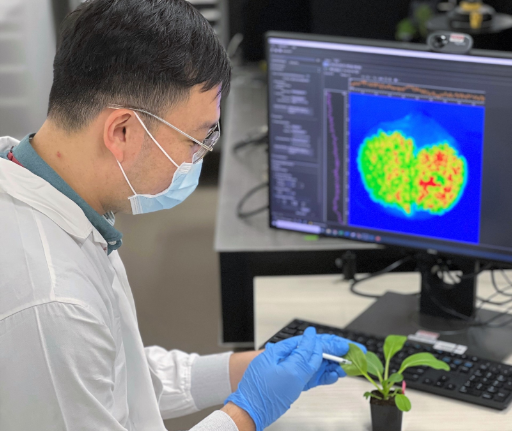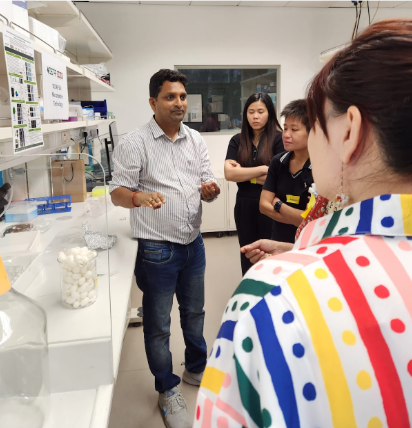DiSTAP-meriSTEM@NIE workshop for STEM educators to enhance their capacity in STEM curriculum design
- SMART

- Oct 30, 2023
- 3 min read
On 25 October 2023, researchers from SMART’s Disruptive and Sustainable Technologies for Agricultural Precision (DiSTAP) interdisciplinary research group (IRG) conducted an educational workshop at the Campus for Research Excellence and Technological Enterprise (CREATE) as part of the Multi-centric Education, Research and Industry STEM Centre at the National Institute of Education’s (meriSTEM@NIE’s) Certificate in STEM Curriculum Development programme.
The workshop introduced the participants to DiSTAP’s emerging interdisciplinary technologies, such as nanosensors and silk microneedles for agriculture. Attended by 28 Ministry of Education (MOE) STEM educators tasked to lead or implement STEM programmes in their schools and institutions, the event comprised introductory talks, a laboratory tour and demonstrations of DiSTAP’s technology.
Dr Mervin Chunyi Ang, Associate Scientific Director at SMART DiSTAP, introduced the IRG by providing a comprehensive overview of their mission, research focus, and interdisciplinary approach, while Dr Raju Cheerlavancha, Senior Postdoctoral Associate at SMART DiSTAP, shared more about DiSTAP’s novel technologies for precision agriculture applications. This included DiSTAP’s world-first microneedle-based drug delivery technique for plants, which can be used to precisely deliver controlled amounts of agrochemicals to specific plant tissues for efficient drug delivery to plants that will be useful for plant science research. When applied in the field, it could be used in precision agriculture to improve crop quality and disease management.

Demonstration of the nanosensor agro-infiltration technique by Dr Mervin Chunyi Ang
Next, participants were able to experience first-hand how nanosensors can be introduced to plants via agro-infiltration, which involves the infusion of a sensor solution through the leaf’s stomata pores using a needleless syringe. This plant biotechnological method is also used to introduce genes, proteins, bacteria, and other substances into leaves.
In this demonstration, participants were guided through the entire process of silk microneedle production. The process involved the conversion of silk cocoons into a silk fibroin solution, which was then used to create silk microneedles with varying physicochemical characteristics. Furthermore, participants had the chance to observe magnified views of silk microneedle patches through a microscope lens.

Demonstration of silk microneedle technology by Dr Raju Cheerlavancha
DiSTAP also had the opportunity to highlight their collaboration with Greenloopfarms Pte Ltd, a local urban farm partner. Participants had previously visited the farm as part of meriSTEM@NIE’s programme, and the session built upon that experience by showcasing how DiSTAP's technologies were being test-bedded in a real-world setting. This integration of theoretical knowledge with practical application served to bridge the gap between academia and industry, illustrating the tangible impact these technologies could have on local farming practices.
This multifaceted approach, combining laboratory tours, live demonstrations, and real-world applications, ensured that participants left the workshop with theoretical knowledge of emerging technologies applicable to food and agricultural sustainability. Given the constant evolution of inventions and innovations, possessing up-to-date knowledge of the latest technologies in STEM fields proves beneficial for designing, teaching, and assessing STEM curricula. Through this workshop, DiSTAP researchers aimed to provide a practical understanding of how these technologies could be seamlessly integrated into Singapore’s cross-disciplinary STEM curriculum and to cultivate a new generation of curious, creative and well-versed students in the intersection of technology, agriculture, and sustainability.
“It is increasingly crucial for students to learn about emerging technologies and recognise the relevance of STEM innovations in today's landscape. There is a growing imperative to instil greater interest among Singaporean students in pursuing careers in STEM. Furthermore, agricultural technologies are closely tied to sustainability and Singapore's 30-by-30 goal for food security. Therefore, it is essential to introduce these technologies to students," said Associate Professor Teo Tang Wee, Co-Head of meriSTEM@NIE Singapore.




Comments